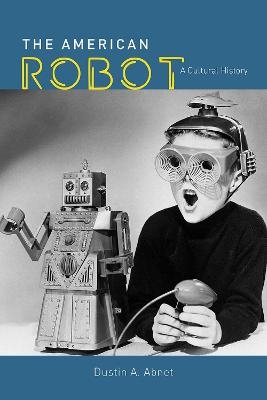
The American Robot
A Cultural History
Seiten
2020
University of Chicago Press (Verlag)
978-0-226-69271-5 (ISBN)
University of Chicago Press (Verlag)
978-0-226-69271-5 (ISBN)
Although they entered the world as pure science fiction, robots are now very much a fact of everyday life. Whether a space-age cyborg, a chess-playing automaton, or simply the smartphone in our pocket, robots have long been a symbol of the fraught and fearful relationship between ourselves and our creations. Though we tend to think of them as products of twentieth-century technology--the word "robot" itself dates to only 1921--as a concept, they have colored US society and culture for far longer, as Dustin Abnet shows to dazzling effect in The American Robot.
In tracing the history of the idea of robots in US culture, Abnet draws on intellectual history, religion, literature, film, and television. He explores how robots and their many kin have not only conceptually connected but literally embodied some of the most critical questions in modern culture. He also investigates how the discourse around robots has reinforced social and economic inequalities, as well as fantasies of mass domination--chilling thoughts that the recent increase in job automation has done little to quell. The American Robot argues that the deep history of robots has abetted both the literal replacement of humans by machines and the figurative transformation of humans into machines, connecting advances in technology and capitalism to individual and societal change. Look beneath the fears that fracture our society, Abnet tells us, and you're likely to find a robot lurking there.
In tracing the history of the idea of robots in US culture, Abnet draws on intellectual history, religion, literature, film, and television. He explores how robots and their many kin have not only conceptually connected but literally embodied some of the most critical questions in modern culture. He also investigates how the discourse around robots has reinforced social and economic inequalities, as well as fantasies of mass domination--chilling thoughts that the recent increase in job automation has done little to quell. The American Robot argues that the deep history of robots has abetted both the literal replacement of humans by machines and the figurative transformation of humans into machines, connecting advances in technology and capitalism to individual and societal change. Look beneath the fears that fracture our society, Abnet tells us, and you're likely to find a robot lurking there.
Dustin A. Abnet is assistant professor of American studies at California State University, Fullerton.
Introduction: An Intimate and Distant Machine
Part 1: God and Demon, 1790–1910
Chapter 1: The Republican Automaton
Chapter 2: Humanizing the Industrial Machine
Chapter 3: Mechanizing Men
Part 2: Masters and Slaves? 1910–1945
Chapter 4: Symbolizing the Machine Age
Chapter 5: Building the Slaves of Tomorrow
Chapter 6: Conditioning the Robot’s Brain
Chapter 7: A War against the Machine Age
Part 3: Playfellow and Protector, 1945–2019
Chapter 8: Preserving American Innocence
Chapter 9: The Postindustrial Gift
Chapter 10: Cheerful Robots
Epilogue: The American Robot
Acknowledgments
Notes
Index
| Erscheinungsdatum | 21.04.2020 |
|---|---|
| Sprache | englisch |
| Maße | 152 x 229 mm |
| Themenwelt | Geisteswissenschaften ► Geschichte ► Regional- / Ländergeschichte |
| Geschichte ► Teilgebiete der Geschichte ► Technikgeschichte | |
| Sozialwissenschaften | |
| ISBN-10 | 0-226-69271-X / 022669271X |
| ISBN-13 | 978-0-226-69271-5 / 9780226692715 |
| Zustand | Neuware |
| Haben Sie eine Frage zum Produkt? |
Mehr entdecken
aus dem Bereich
aus dem Bereich
Buch | Softcover (2024)
Lehmanns Media (Verlag)
CHF 27,90
Digitalisierung neu denken für eine gerechte Gesellschaft
Buch | Hardcover (2023)
Quadriga (Verlag)
CHF 27,95
Vom Perceptron zum Deep Learning
Buch | Softcover (2022)
Springer Vieweg (Verlag)
CHF 27,95


